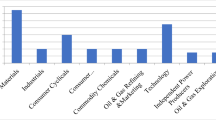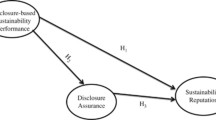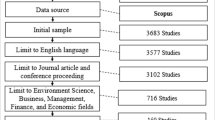Abstract
Drawing on legitimacy theory, we discuss that a company's reputation is a determinant of sustainability disclosure. Specifically, we consider the concept of reputation into three dimensions for analysis: commitment to stakeholders, financial performance and media exposure. This paper differs from previous social and environmental reporting studies in that it investigates both internal and external contextual factors that influence disclosure practice. We claim that companies with a good financial performance, which are adopting an active strategic position towards stakeholders and which are exposed to significant public pressure, are more likely to use sustainability disclosure in order to communicate their legitimacy to operate to stakeholders. Moreover, the paper analyses a wide range of corporate reports for their social and environmental content using an international sample that allows for a comparison of disclosure practices among Continental European, UK and US companies. Our results show that both commitment to stakeholders and media exposure are positively associated with sustainability disclosure. Moreover, we find evidence that the drivers of disclosure vary by information type.
Similar content being viewed by others
Notes
Social items do not include any reference to commitment to stakeholders.
As STAKE is an ordinal variable, we performed also other regression models, using four different dummies, one for each stakeholder engagement item. The regression results confirm that all the stakeholders engagement items are significant and positively correlated to the level of sustainability disclosure.
References
Abbott, W. and Monsen, R. (1979) ‘On the measurement of corporate social responsibility: Self-reported disclosures as a method of measuring Corporate Social Involvement’, Academy of Management Journal, 22 (3), 501–515.
Adams, C.A. (1999) The Nature and Processes of Corporate Reporting on Ethical Issues, CIMA Research Monograph, London.
Adams, C.A. (2002) ‘Internal organisational factors influencing corporate social and ethical reporting: Beyond current theorising’, Accounting, Auditing and Accountability Journal, 15 (2), 223–250.
Adams, C.A. and Larrinaga-González, C. (2007) ‘Engaging with organisations in pursuit of improved sustainability accounting and performance’, Accounting, Auditing and Accountability Journal, 20 (3), 333–355.
Adams, C.A. and McNicholas, P. (2007) ‘Making a difference: Sustainability reporting, accountability and organisational change’, Accounting, Auditing and Accountability Journal, 20 (3), 382–402.
Ahmed, K. and Courtis, J.K. (1999) ‘Associations between corporate characteristics and disclosure levels in annual reports: A meta-analysis’, British Accounting Review, 31 (1), 35–61.
Bebbington, J., Larrinaga-González, C. and Moneva, J.M. (2008) ‘Corporate social responsibility and reputation risk management’, Accounting Auditing and Accountability Journal, 21 (3), 337–362.
Belkaoui, A. and Karpik, P.G. (1989) ‘Determinants of the corporate decision to disclose social information’, Accounting, Auditing and Accountability Journal, 2 (1), 36–51.
Bowman, E.H. and Haire, M. (1975) ‘A strategic posture toward corporate social responsibility’, California Management Review, 18 (2), 49–58.
Brammer, S. and Pavellin, S. (2004) ‘Voluntary social disclosures by large UK companies’, Business Ethics: A European Review, 13 (2/3), 86–99.
Brown, N. and Deegan, C. (1998) ‘The public disclosure of environmental performance information – a dual test of media Agenda setting theory and legitimacy theory’, Accounting and Business Research, 29 (1), 21–41.
Carroll, A.B. (1999) ‘Corporate social responsibility: Evolution of a definitional construct’, Business and Society, 38 (3), 268–295.
Cho, C.H. and Patten, D.M. (2007) ‘The role of environmental disclosures as tools of legitimacy: A research note’, Accounting, Organizations and Society, 32 (7–8), 639–647.
Cormier, D. and Magnan, M. (2003) ‘Environmental reporting management: A continental european perspective’, Journal of Accounting and Public Policy, 22 (1), 43–62.
Deephouse, D.L. and Carter, S.M. (2005) ‘An examination of differences between organizational legitimacy and organizational reputation’, Journal of Management Studies, 42 (2), 329–360.
Erfle, S. and McMillan, H. (1990) ‘Media, political pressure and the firm: The case of petroleum pricing in the late 1970s’, Quarterly Journal of Economics, 105 (1), 115–134.
Fisher, J. (2004) ‘Social responsibility and ethics: Clarifying the concepts’, Journal of Business Ethics, 52, 391–400.
Fombrun, C. (1996) Reputation: Realizing Value from the Corporate Image, Harvard Business School Press, Boston.
Fombrun, C. and Van Riel, C. (1997) ‘The reputational landscape’, Corporate Reputation Review, 1 (1–2), 5–13.
Fombrun, C.J., Gardberg, N.A. and Barnett, M.L. (2000) ‘Opportunity platforms and safety nets: Corporate citizenship and reputational risk’, Business and Society Review, 105 (1), 85–106.
Friedman, A.L. and Miles, S. (2001) ‘Socially responsible investment and corporate social and environmental reporting in the UK: An exploratory study’, British Accounting Review, 33 (4), 523–548.
Gabbioneta, C., Ravasi, D. and Mazzola, P. (2007) ‘Exploring the drivers of corporate reputation; A study of Italian securities analysts’, Corporate Reputation Review, 10 (2), 99–123.
Global Reporting Initiative (GRI) (2006) ‘Sustainability reporting guidelines’, www.globalreporting.org.
Gray, R. (2002) ‘The social accounting project and accounting, organizations and society: Privileging engagement, imagination, new accountings and pragmatism over critique?’ Accounting, Organizations and Society, 27 (7), 687–708.
Gray, R., Kouhy, R. and Lavers, S. (1995) ‘Corporate social and environmental reporting: A review of the literature and a longitudinal study of UK disclosure’, Accounting, Auditing and Accountability, 8 (2), 47–77.
Guthrie, J. and Parker, L.D. (1990) ‘Corporate social disclosure practice: A comparative international analysis’, Advances in Public Interest Accounting, 3, 159–175.
Hackston, D. and Milne, M. (1996) ‘Some determinants of social and environmental disclosures in New Zealand’, Accounting Auditing and Accountability Journal, 9 (1), 77–108.
Haniffa, R.M. and Cooke, T.E. (2002) ‘Culture, corporate governance and disclosure in Malaysian corporation’, Abacus, 38 (3), 317–349.
Hasseldine, J., Salama, A.I. and Toms, J.S. (2005) ‘Quantity versus quality: The impact of environmental disclosures on the reputations of UK plcs’, British Accounting Review, 37 (2), 231–248.
Hutton, W. (2003) The World We’re In, Abacus, London.
Krippendorff, K. (2004) Content Analysis, Sage, California.
Little, P.L. and Little, B.L. (2000) ‘Do perceptions of corporate social responsibility contribute to explaining differences in corporate price-earnings ratios? A research note’, Corporate Reputation Review, 3 (2), 137–142.
Mazzola, P., Ravasi, D. and Gabbioneta, C. (2006) ‘How to build reputation in financial markets’, Long Range Planning, 39 (4), 385–407.
Meek, G.K., Roberts, C.B. and Gray, S.J. (1995) ‘Factors influencing voluntary annual report disclosures by US, UK and continental European multinational corporations’, Journal of International Business Studies, 26 (3), 555–572.
Neter, J., Kutner, M.H., Nachtsteim, C.J. and Wasserman, W. (1996) Applied Linear Statistical Models, Irwin, Boston, MA.
Neu, D., Warsame, H. and Pedwell, K. (1998) ‘Managing public impressions: Environmental disclosures in annual reports’, Accounting, Organizations and Society, 23 (3), 265–282.
O'Dwyer, B. (2003) ‘Conceptions of corporate social responsibility: The nature of managerial capture’, Accounting, Auditing and Accountability Journal, 16 (4), 523–557.
Patten, D.M. (1990) ‘The market reaction to social responsibility disclosures: The case of the Sullivan principles signings’, Accounting, Organizations and Society, 15 (6), 575–587.
Patten, D.M. (1991) ‘Exposure, legitimacy, and social disclosure’, Journal of Accounting and Public Policy, 10 (4), 297–308.
Patten, D.M. (1992) ‘Intra-industry disclosure in response to the Alaskan oil spill: A note on legitimacy theory’, Accounting, Organizations and Society, 17 (5), 471–475.
Patten, D.M. (2002) ‘The relation between environmental performance and environmental disclosure: A research note’, Accounting, Organizations and Society, 27 (8), 763–773.
Pava, M.L. and Krausz, J. (1996) ‘The association between corporate social responsibility and financial performance: The paradox of social cost’, Journal of Business Ethics, 15 (3), 337–347.
Roberts, C. (1991) ‘Environmental disclosures: A note on reporting practices in mainland Europe’, Accounting, Auditing and Accountability Journal, 4 (3), 62–71.
Roberts, P.W. and Dowling, G.R. (2002) ‘Corporate reputation and sustained superior financial performance’, Strategic Management Journal, 23 (12), 1077–1093.
Roberts, R. (1992) ‘Determinants of corporate social responsibility disclosure: An application of stakeholder theory’, Accounting, Organizations and Society, 17 (6), 595–612.
Sanchez, J.L.F. and Sotorrìo, L.L. (2007) ‘The creation of value through corporate reputation’, Journal of business Ethics, 76 (3), 335–346.
Shenkar, O. and Yuchtman-Yaar, E. (1997) ‘Reputation, image, prestige, and goodwill: An interdisciplinary approach to organizational standing’, Human Relations, 50 (11), 1361–1381.
Siltaoja, M.E. (2006) ‘Value priorities as combining core factors between CSR and reputation – a qualitative study’, Journal of Business Ethics, 68 (1), 91–111.
Stinchcombe, A. (1965) ‘Organizations and social strutcure’, in J.G. March (ed.), Handbook of Organizations, Rand McNally, Illinois, pp. 142–193.
Suchman, M.C. (1995) ‘Managing legitimacy: Strategic and institutional approaches’, Academy of Management Journal, 20 (3), 571–610.
Toms, J.S. (2002) ‘Firm resources, quality signals and the determinants of corporate environmental reputation: Some UK evidence’, British Accounting Review, 34 (3), 257–282.
Ullmann, A. (1985) ‘Data in search of a theory: A critical examination of the relationship among social performance, social disclosure, and economic performance’, Academy of Management Review, 10 (3), 540–577.
Unerman, J. and Bennett, M. (2004) ‘Increased stakeholder dialogue and the internet: Towards greater corporate accountability or reinforcing capitalist hegemony?’ Accounting Organizations and Society, 29 (7), 685–707.
Acknowledgements
The author would like to express her gratitude to Saverio Bozzolan, James Guthrie, Den Patten, Federica Ricceri, Giacomo Boesso and to the anonymous referees for their helpful comments.
Author information
Authors and Affiliations
Rights and permissions
About this article
Cite this article
Michelon, G. Sustainability Disclosure and Reputation: A Comparative Study. Corp Reputation Rev 14, 79–96 (2011). https://doi.org/10.1057/crr.2011.10
Published:
Issue Date:
DOI: https://doi.org/10.1057/crr.2011.10




